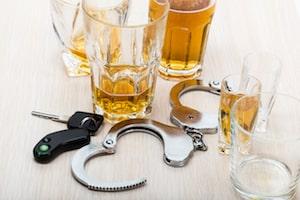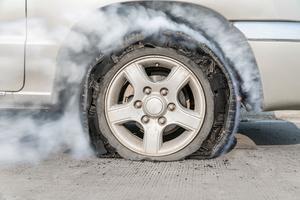Recent Blog Posts
Underage Drinking Charges in Wisconsin

Getting a call from the police department is rarely fun. When that call from the police is to inform you they have your teenager in custody, it can be devastating.
According to the U.S. Department of Health and Human Services, alcohol is the most widely used drug among teenagers, even though it is illegal for anyone under the age of 21 to consume alcohol. Though underage DUI incidents have decreased over the past few years, it is still a problem with serious consequences.
Underage Drinking Laws
There are technically two categories of underage drinking laws in Wisconsin. If your child is under the age of 17 and they are caught in possession of or consuming alcohol, it is categorized as a juvenile charge. If they are between the ages of 17 and 20 and caught in possession or consuming alcohol, it is categorized as an underage charge.
How to Get an Occupational License After an OWI in Wisconsin
 There are multiple ways you can be charged with operating a vehicle while intoxicated (OWI) in Wisconsin, and all of them have serious consequences. You be charged with OWI if your blood-alcohol content is more than .08, if you have a detectable amount of an intoxicant or restricted controlled substance in your blood, or if you are under the influence of any drug or controlled substance.
There are multiple ways you can be charged with operating a vehicle while intoxicated (OWI) in Wisconsin, and all of them have serious consequences. You be charged with OWI if your blood-alcohol content is more than .08, if you have a detectable amount of an intoxicant or restricted controlled substance in your blood, or if you are under the influence of any drug or controlled substance.
It is never a good idea to get behind the wheel if you have had too much alcohol, or if you have taken illegal or prescription drugs that can negatively impact your ability to drive. The National Highway Traffic Safety Administration reported about 32 percent of all fatal Wisconsin traffic accidents in 2016 were alcohol-related.
If you are convicted of an OWI, you may face a lengthy license suspension or revocation. You could offset that inconvenience with an occupational license. Here are the details:
Can My Wisconsin CCW License Be Revoked?

The United States Constitution gives American citizens the right to own and bear arms. While this right is granted to all citizens, states have enacted restrictions that can prohibit you from owning or carrying a firearm. Although the Constitution states it is a right to own a gun, most states look at it as a privilege that can be revoked.
Many people who own firearms have concealed carry weapon (CCW) licenses so they can protect their family, friends, and communities if needed, but in Wisconsin, some offenses can cause you to lose the privilege of carrying a concealed weapon.
CCW Revocations and Suspensions
There are two ways you can lose your CCW: through revocation or suspension.
A suspension will occur if you are charged with a crime, bail is set, and one of the conditions of your bail is for you not to possess a dangerous weapon. The Wisconsin Department of Justice is required to send you a notice within a day of your suspension, and it goes into effect when you receive that notice. The suspension is not permanent. Once you are no longer prohibited to possess a firearm, you can ask the DOJ to conduct a new background check, and have your CCW reinstated.
Examining Field Sobriety Tests in Wisconsin

Police officers in Wisconsin must have substantial evidence to actually arrest someone for operating while intoxicated (OWI). There are a few things an officer may use to do this, and one common procedure is to request the completion of field sobriety tests, so they can gauge whether a driver is intoxicated while driving.
The types of field sobriety tests used can differ from state to state, and sometimes between police departments and jurisdictions, but in general, a battery of three standardized tests is used. These tests are approved by the National Highway Traffic Safety Administration (NHTSA) as being accurate a majority of the time:
Horizontal Gaze Nystagmus (HGN) Test
When the eye looks off to the side, there is a slight involuntary jerking of the eyeball called horizontal gaze nystagmus. Everyone’s eye involuntary shakes when you look to the side, but when you are intoxicated, the nystagmus is more pronounced and occurs earlier than if you are sober. During the test, the officer has you follow the movement of an object, such as a pen or flashlight, while they examine your eyes to look for exaggerated nystagmus, and your ability to follow the object.
Eligibility for Firearm Possession and CCW Licenses in Wisconsin
 United States citizens are guaranteed the right to bear arms by the Second Amendment to the U.S. Constitution. While this federal statute gives individuals that right, states have the ability to restrict the law. One way they can do so is to create stipulations on who can and cannot own a firearm and apply for a concealed carry weapon (CCW) license.
United States citizens are guaranteed the right to bear arms by the Second Amendment to the U.S. Constitution. While this federal statute gives individuals that right, states have the ability to restrict the law. One way they can do so is to create stipulations on who can and cannot own a firearm and apply for a concealed carry weapon (CCW) license.
Wisconsin has state laws that apply to its residents, but people in the state must also follow federal laws that apply to all U.S. citizens. Those who violate firearm possession laws can face serious consequences.
CCW License Eligibility
While Wisconsin does not require its residents to have a permit to own or possess a firearm, you must apply and successfully obtain a CCW license before you can legally carry a concealed firearm. To be eligible for a CCW license, you must:
Exploring Your Rights and Options as the Victim of a Crime in Wisconsin
 As one might expect, being a victim of a crime--especially a violent crime--can be very challenging and confusing. There is no such thing as a victimless crime, and you may be wondering why it has happened to you. You could be suffering from post-traumatic stress disorder (PTSD), or you could be trying to recover lost property. Whatever the crime was that was committed against you, it is important to know that as a victim, you have rights, and you have options about which steps to take next. If you have been a victim of a crime, consider taking steps to gain justice and/or compensation.
As one might expect, being a victim of a crime--especially a violent crime--can be very challenging and confusing. There is no such thing as a victimless crime, and you may be wondering why it has happened to you. You could be suffering from post-traumatic stress disorder (PTSD), or you could be trying to recover lost property. Whatever the crime was that was committed against you, it is important to know that as a victim, you have rights, and you have options about which steps to take next. If you have been a victim of a crime, consider taking steps to gain justice and/or compensation.
Seeking Remedies From the Courts
The aftermath of a crime can be a scary and traumatic time for a victim. Fortunately, there are actions that you can take to bring your offender to justice and protect yourself, including:
Consequences for Driving Under the Influence in Wisconsin
 When you are behind the wheel of a car, you have a duty to other people on the road, and that duty is simple: behave in a way that does not put yourself or others into danger. Unfortunately, according to the Wisconsin Department of Transportation, around 28,790 people were arrested for operating a vehicle while intoxicated (OWI) in 2015, and 23,931 were actually convicted. Drunk driving can be deadly, and even when it is not, it can cause a great deal of harm, which is why a DUI/OWI charge in Wisconsin is taken very seriously.
When you are behind the wheel of a car, you have a duty to other people on the road, and that duty is simple: behave in a way that does not put yourself or others into danger. Unfortunately, according to the Wisconsin Department of Transportation, around 28,790 people were arrested for operating a vehicle while intoxicated (OWI) in 2015, and 23,931 were actually convicted. Drunk driving can be deadly, and even when it is not, it can cause a great deal of harm, which is why a DUI/OWI charge in Wisconsin is taken very seriously.
First Offense OWI
Consequences for a first-time DUI conviction in Wisconsin are mainly aimed at educating the offender and changing their habits or behaviors. There is typically no jail time, but there is a possible fine of $100 to $300, plus a $435 OWI surcharge. First-time offenders will also face a driver’s license revocation of six to nine months, and if their blood alcohol content (BAC) was over .15, an ignition interlock device or 24/7 sobriety program will be required for one year.
Understanding Concealed Carry Laws in Wisconsin
 If you are one of the many thousands of responsible gun owners in Wisconsin, you want to possess the information necessary to avoid any weapons violations. With its vast knowledge of concealed carry offenses and other weapons charges, the Bucher Law Group, LLC, believes in the protection of your rights as a gun owner and is here to handle your case if you are charged.
If you are one of the many thousands of responsible gun owners in Wisconsin, you want to possess the information necessary to avoid any weapons violations. With its vast knowledge of concealed carry offenses and other weapons charges, the Bucher Law Group, LLC, believes in the protection of your rights as a gun owner and is here to handle your case if you are charged.
In 2011, Act 35 went into effect in Wisconsin, allowing residents to carry concealed weapons. Here is a look at how to obtain a concealed carry weapon (CCW) permit and what it covers:
How to Get a CCW Permit
The Wisconsin Department of Justice states a CCW permit applicant must be at least 21 years old, not be prohibited from possessing a gun under law or as a condition of bail or release in a criminal case, and provide proof of firearms training.
The DOJ offers online registration and renewals for licensees, or you can request an application by calling them directly. Applicants must supply documentation from a recognized firearms training program. A notice of acceptance or denial will be issued within 21 days of receipt.
Common Car Maintenance Myths
 Properly maintaining your car is just as important as driving defensively. Regular car maintenance reduces your risk of a severe car accident, keeping yourself and others safe. Since it can be difficult to determine which car maintenance tips to follow and which ones to ignore, we have debunked the most common car maintenance myths.
Properly maintaining your car is just as important as driving defensively. Regular car maintenance reduces your risk of a severe car accident, keeping yourself and others safe. Since it can be difficult to determine which car maintenance tips to follow and which ones to ignore, we have debunked the most common car maintenance myths.
Myth 1: Look at Your Vehicle’s Sidewalls to Determine the Correct Tire Inflation Pressure
Many drivers make the mistake of looking at their vehicle’s sidewalls to determine the ideal tire inflation pressure. The truth is that their vehicle’s manufacturer may have another suggestion that is better suited for their car and that improves both fuel consumption and safety. Be sure to check your tire pressure on a monthly basis or whenever extreme temperature fluctuations occur.
Five Fall Motorcycle Safety Tips for Every Rider
 As fall makes its debut, motorcycle riders excitedly anticipate the cooler weather along with the beauty of the season. For many enthusiasts, nothing compares to a long, relaxing ride through the countryside with the crisp, autumn air blowing past. Although the conditions seem prime, the season poses potential risks for motorcyclists. These safety guidelines offer a friendly reminder for motorcyclists to help keep them and other motorists safe. These best practices are proven to can significantly reduce the risk of motorcycle accidents and injuries.
As fall makes its debut, motorcycle riders excitedly anticipate the cooler weather along with the beauty of the season. For many enthusiasts, nothing compares to a long, relaxing ride through the countryside with the crisp, autumn air blowing past. Although the conditions seem prime, the season poses potential risks for motorcyclists. These safety guidelines offer a friendly reminder for motorcyclists to help keep them and other motorists safe. These best practices are proven to can significantly reduce the risk of motorcycle accidents and injuries.
1. Be Mindful of Leaves
Falling leaves, as well as leaves on the ground, are beautiful. However, they can be dangerous or even deadly, especially when they are wet. Leaves easily cover up potholes and other potential driving hazards. Wet leaves potentially lead to traction issues, which can make it difficult for motorcyclists to maintain complete control of their bikes.














 262-446-9222
262-446-9222 262-446-9885
262-446-9885






